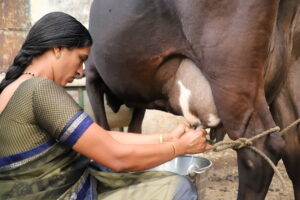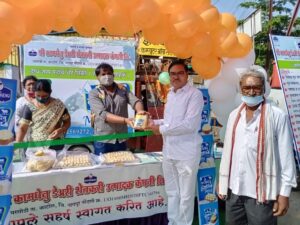Diversification is a way forward for smallholder farm livelihoods caught in fragile eco systems. Diary husbandry is one of them. Diary farmers in Vidarbha have come together to form Shri Kamdhenu Dairy Farmer Limited, an FPO, which is being managed successfully, offering a variety of services for enhanced milk production.
Vidarbha area of Maharashtra is well recognised for droughts and crop failures. Majority of the farmers depend on agriculture for livelihoods. A combination of adverse factors like fragile rain fed ecosystem, degraded soils, high input costs, problems of pests and diseases, crop choices and extreme dependencies, limited credit availability, market challenges make farming risky and less profitable, especially for cotton farmers. Recurring losses and seemingly hopeless situations have driven farmers into distress, sometimes leading to extreme steps like suicides.

Mahila Pashu Palak trained in dairy enterprise
Diversification is a way forward to tackle the challenge. Dairy husbandry is one of the them. Livestock development offers additional avenue for families. This article deals with efforts made to improve genetic potential of the local cattle and buffaloes for better milk production through artificial insemination and a wide range of supporting activities.
The Initiative
The BAIF’s Cattle Breeding Centre was started in the year 2016. A bunch of services were rendered to produce quality breeds of animals. BAIF started doorstep artificial insemination services and as a result, 940 female calves have been born in this area in five years. (see Table 1). In the beginning, it was a struggle to promote artificial insemination as farmers were lacking this knowledge. It was a big challenge to change mind sets of farmers. Gradually, through awareness programs, farmers became aware of the business of dairy husbandry.
Milk production growth
With increasing animal population, milk production too increased. The milk production statistics of the area indicate steep increases. In 2016, only 150-liters of daily milk production was recorded from 6 villages (e.g., Parsodi, Ladgaon, Kedarpur, Kukadi Panjara, Pardi (Go), Borgondi). In 2020, in the same villages, milk production has gone up to 1250 litres per day. After looking at the potential of business, more than 150 farmers from 17 villages have participated in the dairy business in the year 2021 and the milk production increased to more than 2500 litres per day. (See Table 1)
Table 1: Year wise figures of increased milking cattle’s, milk production and farmers involvement
| Year |
Milking Cattle (Nos.) |
Milk Production (In Litres) |
Farmers Involved (Nos.) |
| 2016 | 91 | 261 | 43 |
| 2017 | 113 | 430 | 53 |
| 2018 | 223 | 750 | 67 |
| 2019 | 249 | 983 | 79 |
| 2020 | 263 | 1250 | 89 |
| 2021 | 443 | 2500 | 151 |
Farmers started facing the challenge of selling the milk produced. The challenges farmers faced are presented below.
- Milk production increased but the market was not available for the farmers to sell their produce.
- There were some buyers but the rates they got for their produce was not good enough.
- They had to go to far off blocks for selling their milk as there are no dairy and chilling plants nearby, for storage.
- Farmers sold their produce to the retailers who made value-added milk products.
- Farmers explored direct selling to consumers through door to door approach in Block which was very stressful and time consuming.
Formation of FPO
Considering the importance of the prevailing situation, a strategic decision was taken to promote a Farmer Producer Organization to tackle the challenge at the grassroots level. As a result, FPO was established with the aim of providing one window solution/services for all the portfolios of animal husbandry. NABARD came forward to support a dairy-based Farmer Producer Company in that area. In 2020, under the NABARDs Producer Organization Development Fund, one FPO was established named Shri Kamdhenu Dairy Farmer Producer Company Limited. NABARD provided financial support for 3 years from 2020 to 2022.
Shri Kamdhenu Dairy Farmer Producer Company Limited was registered as a limited company with the Registrar of Companies in Nagpur in 2020. The FPO comprises 362 milk producers from 17 villages, of which 224 (61.87%) farmer shareholders are small and marginal farmers having their landholding less than 2 hectares. It was established on 11th September 2020 with ten young dynamic Board of Directors with experience of practising Dairy and Milk collection centres. The elected Board of Directors include four women members and six male members. The FPC has an Authorised Capital of Rs. 10 lakhs and Paid-Up Capital of Rs. 5 lakhs.
The emphasis was on capacity building of Directors, CEO and shareholder members on Governance and Management of FPO. Focus was on business plan development and forward linkages, processing and value addition of milk and awareness building programmes on dairy processing through FPO. CEO was trained on value addition and milk processing, calculating profits and losses, and governance aspects of FPO. Further, the guidance was on setting up the processing unit, establishing market linkages and obtaining basic licences required for the same.
The following services have been taken up by Shri Kamdhenu Dairy Farmer Limited pertaining to input supply, value addition and marketing.
Input supply
- Doorstep Artificial Insemination (differential rates to shareholders and irregular farmers)
- Supplies good quality of mineral mixture to address mineral deficiencies in cattle.
- Provides improved fodder varieties for feed management of cattle
- Supplies good quality cattle feed at marginal rates as compared to the market.
- Encourages farmers to make silage and produce the silage and to be sold by the FPO
Value addition
- Processing milk into Khawa, Paneer, Curd, Buttermilk, Ghee, Sweets, Shri Khand etc.
- Aggregating the agricultural wastes of Cotton, Soyabean and Tur crops and supply to the processor.
Output marketing – forward linkages
- Creating single window outlets for all dairy products at the block level.
- Doorstep supply of good quality milk to consumers, offered at marginal rates in comparison to other dairies/ big brands.
- Providing organic fertilizer to the farmers (vermicompost with earth worms).
- Working on meeting the needs of the farmers in any sector and fulfilling them.
In the beginning, one group (involved in production of various milk products on a small scale) was producing the Khawa in that village. After the establishment of the FPO, it was decided that the unit would be merged into the FPO. Beginning with selling milk, it expanded to value added products like Paneer, Shri Khand, Curd, Buttermilk, Butter etc. Initially when the journey started, it was on a small scale, but gradually evolved into a business activity.
|
Box 1: The ten management practices followed by women for better management of diary business. Promoting artificial insemination and improved breeds of cattle for enhanced milk production at household level Carrying out deworming and vaccination schedule for maintaining cattle health Primary treatment (by ethnic veterinarians) for cattle. Fodder production – Women are aware about fodder crops; cultivation times; value addition to silage; methods of feeding the cattle. Feed mineral mixtures regularly to the cattle, based on their knowledge on mineral deficiencies in cattle. Assessing the feed requirements of the cattle as per animal’s body weight Using regularly cattle manger for cattle feed and avoiding fodder wastage Maintaining Clean Cattle Shade and Climate Smart Cattle Shade. Improved practices of hygienic milking practices Management of cowdung for use as Biogas for fuel and converting waste into vermicompost and efficient decomposition. |
Women Centric Approach
One of the key strategies and learnings was making the initiative a women centric one. Women’s participation is the key factor in the process and success of the dairy business as they are most active in the management of cattle rearing, from milking to overall management of cattle. Therefore, the emphasis was on improving livestock management practices handled by women. More than 100 women livestock keepers promote clean milking to provide healthy and hygienic products.
Ten cattle management practices were given extra emphasis to enhance incomes while rearing cattle effectively. (see Box 1).
In the beginning, in 2016, only 40 women farmers were involved. At the end of 2020, more than 100 women have adopted proper management practices learnt through skills acquired from the BAIF’s cattle breeding programme.
Around 100 women have been trained as “Mahila Pashu Palak” in best practices in animal husbandry. Women are practicing vermicomposting, biogas use, primary treatment (Ethnos veterinary), clean milking, cattle feed management, value addition of fodder, climate smart cattle houses, cattle breeding services. More than 80% of households have saved costs on cattle rearing.
Three self-help groups as well as individual women are practicing vermicomposting resulting in improved livelihoods.
Impact on farmer livelihoods
FPO has positively touched lives of many farmers in different scenarios. In three years, the following data reveals how farmers have availed the services and benefitted.
- 55 farmers have supplied milk to the FPC and they increased their income by 15% in two years.
- More than 137 farmers saved costs on feed.
- 12 individual farmers and 4 SHGs enhanced their income by 20% in two years.
- 179 farmers were the consumers.
- Suppliers increased their income by at least 10%.
- 194 farmers have benefited through Artificial Insemination program; 15% costs have been saved on management of cattle.
- FPO has supplied cotton residue to the briquette manufacturer- by which more than 50 farmers have benefitted with 5-7% enhanced income.
- FPO has supplied milk to more than 20 shareholders of block, thereby each household saving 10% every day on purchasing milk from others.
Marketing

Members sell value added products through a stall set up by FPO
SKDFPCL, has established its own brand – SHRI KAMDHENU. It was necessary to attract consumers. Therefore, it was very essential to establish their brand along with quality products and packaging. Now, SKDFPCL has expanded its outreach in the Katol city. It plans to spread around the district in upcoming years. The response from consumers has been positive. SKDFPCL is selling many value added products. (see Table 2, p.35)
Table 2: Milk Products sold by FPC
| Sr.no | Particular | Production (in Kg) | Rates | Amount |
| 1 | Khowa Making | 2464.89 | 291.59 | 7,18,729.90 |
| 2 | Panner | 5338 | 267.91 | 14,30,100.26 |
| 3 | Pedha | 1328.7 | 272.80 | 3,62,473.76 |
| 4 | Loni | 37.7 | 441.91 | 16,660.00 |
| 5 | Basundi | 133 | 167.59 | 22,289.81 |
| 6 | Tup | 109.33 | 441.63 | 48,283.14 |
| 7 | Curd | 64.79 | 25.00 | 1,619.75 |
| 8 | Cream | 815.83 | 160.61 | 1,31,029.11 |
| 9 | Rabadi | 87 | 250.00 | 21,750.00 |
| 10 | Sold to Dairy | 6352 | 42.64 | 2,70,849.28 |
| 11 | Home to Home | 32203 | 44.77 | 14,41,623.52 |
| Total | 44,65,408.53 | |||
| Total Expenditure | 43,39,377.53 | |||
| Profit | 1,26,031.00 | |||
Challenges and Way forward
There are challenges too. The major challenge Shri Kamdhenu Dairy Farmer Producer Company Limited facing is expansion, owing to financial and marketing limitations. However, it is continuously making efforts by participating in various exhibitions and workshops.
The greatest satisfaction is that the farmers are fully aware of the potential of the diary business. They actively participate and are involved in taking decisions.
The FPO looks forward to expand. The expansion strategy includes expanding the business of the FPO to nearby districts of Vidarbha; providing extension services to farmers; opening of self-outlets in capital cities as soon as possible; availing opportunities offered by Government schemes, such as, PMFME, SMART, PoCRA and others.
Amar Raipur
District Program Officer | BAIF
C/O: Amol Pethe House, Uttam City, Ward No. 01, Hinganghat Road,
Near Grampanchayat, Inzapur, At. Inzapur, Post. Borgaon (Meghe), Ta. Dist.
Wardha – 442001, Maharashtra, India
E-mail: amarraipure2908@gmail.com









